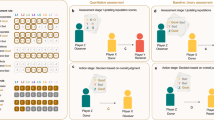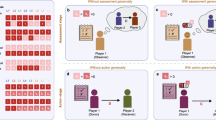Abstract
Can a social norm of trust and reciprocity emerge among strangers? We investigate this question by examining behavior in an experiment where subjects repeatedly play a two-player binary “trust” game. Players are randomly and anonymously paired with one another in each period. The main questions addressed are whether a social norm of trust and reciprocity emerges under the most extreme information restriction (anonymous community-wide enforcement) or whether trust and reciprocity require additional, individual-specific information about a player’s past history of play and whether that information must be provided freely or at some cost. In the absence of such reputational information, we find that a social norm of trust and reciprocity is difficult to sustain. The provision of reputational information on past individual decisions significantly increases trust and reciprocity, with longer histories yielding the best outcomes. Importantly, we find that making reputational information available at a small cost may also lead to a significant improvement in trust and reciprocity, despite the fact that most subjects do not choose to purchase this information.
Similar content being viewed by others
References
Berg J., Dickhaut J., McCabe K.: Trust, reciprocity, and social history. Games Econ Behav 10, 122–142 (1995)
Bohnet I., Harmgart H., Huck S., Tyran J.-R.: Learning trust. J Eur Econ Assoc 3, 322–329 (2005)
Bolton G., Katok E., Ockenfels A.: How effective are electronic reputation mechanisms? An experimental investigation. Manag Sci 50, 1587–1602 (2004)
Bolton G., Katok E., Ockenfels A.: Cooperation among strangers with limited information about reputation. J Public Econ 89, 1457–1468 (2005)
Bolton G., Ockenfels A.: ERC: A theory of equity, reciprocity, and competition. Am Econ Rev 90, 166–193 (2000)
Brown M., Zehnder C.: Credit reporting, relationship banking, and loan repayment. J Money Credit Bank 39, 1883–1918 (2007)
Camerer C.F.: Behavioral Game Theory: Experiments in strategic interaction. Princeton University Press, Princeton (2003)
Camera G., Casari M.: Cooperation among strangers under the shadow of the future. Am Econ Rev 99, 979–1005 (2009)
Charness G., Du N., Yang C.-L.: Trust and trustworthiness reputations in an investment game. Games Econ Behav 72, 361–375 (2011)
Dal Bo P.: Social norms, cooperation and inequality. Econ Theory 30, 89–105 (2007)
Duffy J., Ochs J.: Cooperative behavior and the frequency of social interaction. Games Econ Behav 66, 785–812 (2009)
Ellison G.: Cooperation in the prisoner’s dilemma with anonymous random matching. Rev Econ Stud 61, 567–588 (1994)
Engle-Warnick J., Slonim R.L.: Learning to trust in indefinitely repeated games. Games Econ Behav 54, 95–114 (2006a)
Engle-Warnick J., Slonim R.L.: Inferring repeated-game strategies from actions: evidence from trust game experiments. Econ Theory 28, 603–632 (2006b)
Fehr E., Schmidt K.: A theory of fairness, competition and cooperation. Q J Econ 114, 817–868 (1999)
Fischbacher U.: z-tree: zurich toolbox for ready-made economic experiments. Exp Econ 10, 171–178 (2007)
Greif A.: Reputation and coalitions in medieval trade. J Econ Hist 49, 857–882 (1989)
Greif A.: Contract enforceability and economic institutions in early trade: the Maghribi traders’ coalition. Am Econ Rev 83, 525–548 (1993)
Kandori M.: Social norms and community enforcement. Rev Econ Stud 59, 63–80 (1992)
Keser C.: Experimental games for the design of reputation management systems. IBM Syst J 42, 498–506 (2003)
Milgrom P., North D., Weingast B.: The role of institutions in the revival of trade: The law merchant, private judges, and the Champagne fairs. Econ Politics 2, 1–23 (1990)
Xie, H., Lee, Y.-J.: Social norms and trust among strangers. Working paper, Concordia University (2011)
Young H.P.: Social norms. In: Durlauf, S.N., Blume, L.E. (eds) The New Palgrave Dictionary of Economics, 2nd edn, Palgrave Macmillan, New York (2008)
Author information
Authors and Affiliations
Corresponding author
Additional information
For helpful comments and suggestions we wish to thank the Editor, an anonymous referee, Andreas Blume, Giovanna Devetag, Guillaume Frechette, Soiliou Namoro, Lise Vesterlund, Roberto Weber, as well as seminar participants at Carnegie-Mellon University, Iowa State University, Fudan University, Shanghai Jiao Tong University, the University of Copenhagen, the 2009 CEA annual meeting and the 2009 DIME Workshop on Market and Firm Dynamics.
Rights and permissions
About this article
Cite this article
Duffy, J., Xie, H. & Lee, YJ. Social norms, information, and trust among strangers: theory and evidence. Econ Theory 52, 669–708 (2013). https://doi.org/10.1007/s00199-011-0659-x
Received:
Accepted:
Published:
Issue Date:
DOI: https://doi.org/10.1007/s00199-011-0659-x
Keywords
- Social norms
- Trust game
- Random matching
- Trust and reciprocity
- Information
- Reputational mechanisms
- Experimental economics




